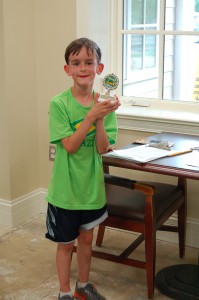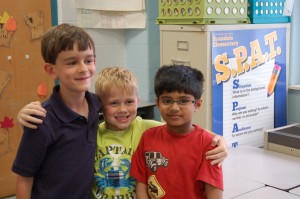I am currently dealing with a uniquely American problem: I am drowning in my own stuff. My stuff has got stuff. Ten years ago, my 1,000-square-foot apartment seemed spacious. Now my 1900-square-foot home (plus basement and storage shed) is bursting at the seams. I know this problem is common; it’s why The Container Store and books and TV shows dedicated to organization exist. America is the land of recreational shopping and the aesthetic of more is more.
This American, however, has reached a breaking point. I’m sick of looking at stuff piled up everywhere. I’m sick of how long it takes to organize and clean. And I’m really sick of how long it sometimes takes to find things. Basically, I have too much of everything and my house is stressing me out.
As recently as three days ago, I thought this would be easy. I’ve already cleared out well over half of my books, made a run to electronics recycling, set aside items to take to hazardous waste, and boxed up clothes to donate. I naively assumed that once Matt tidied up his musical stuff and I cleared out Simon’s old toys, I’d be all set.
Unfortunately, it’s not working out that way. We’re no longer a disaster zone, and we certainly have more breathing room, but I still feel like I am living among too much clutter. I want space and the calm comes from clutter free shelves and empty surfaces. I want a house that’s easy to dust and that inspires a sense of calm.
So what is all this stuff, and how did there get to be so much of it?
That first question is easy to answer:
- It’s Matt’s work stuff since he’s a full-time telecommuter.
- It’s my volunteer and work stuff
- It’s house stuff we didn’t need when we rented
- It’s music stuff
- It’s kid stuff
- It’s family and/or nostalgic stuff
Items 1-3 can be better organized. Item 4 is currently totally out of control and involves not just clutter, but also dirt, as I cannot reach all the places I need to clean. Item 5 is coming along nicely. In fact, when I asked Simon to help me box up toys he no longer plays with, he tried to box up every toy he owns except for board games and Nerf blasters. I actually had to retrieve a couple of items from the discard pile so he’d have something for friends to play with.
Number 6 will require a stiff drink to get started. As the family historian and lone girl among my siblings, I have ended up with a ton of family stuff; decorative items, jewelry, photos, you name it. I’ve even got some stuff that my cousin could not bear to throw out when her mother died. I’ve got my grandmother’s (chipped) engraved glasses, tea plates for more people than will fit into my house, needlework supplies I’ll never use, tchotchkes I don’t much like, and jewelry I’ll never wear.
It’s all got to go.
But here’s the thing. I’m not convinced that that will be enough. The fact is, our old 1,000-square-foot flat had to house living room and dining room furniture, one bedroom set, and one part-time office. Our 1900-square-foot house has to include three separate bedroom sets (one for guests), one full-time office, and one part-time office. We’ve got more guitars, amplifiers, tools, and sports equipment than we used to. We have stuff to host parties. We have stuff to prune trees, mow the lawn, and unclog drains.
Which brings me to a startling conclusion. I have three choices:
- I can move to a larger house.
- I can live with the clutter.
- I can redefine “necessity”.
I go into many homes where there isn’t nearly as much stuff as we have. Most are childless, it’s true, but it does happen. I see pictures of truly minimalist spaces: As far as I can tell, Japanese people own virtually nothing. I’m not moving. I’m sick of the clutter. So #3 is looking like my chosen path. Once I finish getting rid of all the stuff I know I can get rid of, I’m going to take a long, hard look at everything I think I need to keep.
Will I ever use my hair dryer again? Do I need to hold on to knitting supplies in the event I take up the hobby again? How many of my kitchen dishes really get used? How many display items do I like that much? It’s time to apply the William Morris theorem to my house: If I do not believe it to be beautiful or know it to be useful, it can’t live here any more.

